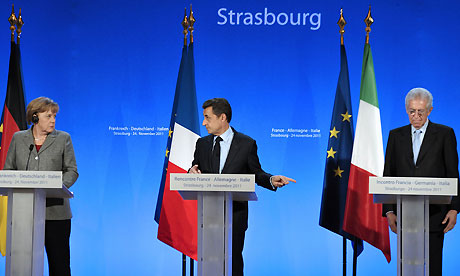• Merkel rules out expanded role for European Central Bank
• Instead calls for EU treaty changes to advance fiscal union
• Eurozone bond yields soar
• UK borrowing costs lower than those of Germany
- guardian.co.uk, Thursday 24 November 2011 15.44 GMT
- Article history

Leaders of the eurozone's three biggest economies have squashed market hopes for a huge intervention by the European Central Bank to solve the sovereign debt crisis and prevent a renewed recession.
With eurozone bond yields soaring and UK borrowing costs below those of Germany for the first time since 2009, Angela Merkel, the German chancellor, again ruled out any expanded role for the ECB and stamped upon proposals for eurobonds to share sovereign risk. The ECB, she said, was responsible for monetary policy alone.
At a news conference with French president Nicolas Sarkozy and new Italian premier Mario Monti in Strasbourg, Merkel instead pointed to forthcoming plans for EU treaty changes to advance a – distant – fiscal union in the eurozone and, at most, early agreement to boost the bailout fund, the EFSF.
The euro began to drop as soon as Sarkozy clearly kowtowed to Berlin only hours after his foreign minister, Alain Juppé, had called for urgent intervention by the ECB to "play an essential role in restoring confidence".
The French president said proposals for changing the EU treaties would be made "in the forthcoming days" but insisted that the ECB's independence was untouchable – and political leaders would make "neither positive nor negative" demands upon the central bank. Monti took a similar stance.
Merkel said the trio would "do everything to defend the euro" and "we want a strong, stable euro" but repeated her mantra that this required strict actions by governments to abide by the rules of the stability and growth pact setting limits on budget deficits and national debt.
The trio's comments, which poured cold water on any lingering market hopes of early and concerted intervention in the face of the deepening debt crisis, came as European banks run the increasing risk of being sucked into the vortex and of a renewed credit crunch.
Only a day after Germany failed to find buyers for a third of a planned €6bn (£5.15bn) auction of 10-year bunds, Belgian bonds soared to 5.7%, Portugal's credit rating was notched down to junk status and an ECB governing council member said the downturn would be "significantly longer than we expected" – despite a 0.5% rise in German economic output in the third quarter.
German media reports suggested that, privately, the country's political leaders are preparing to cave in on both ECB intervention and eurobonds – when the crisis gets to intolerable or unsustainable levels.
The only concrete decision to emerge from the mini-summit in the Alsatian capital was that the three are to meet again soon in Rome to discuss further Monti's pledge for structural reforms to promote growth and for a balanced Italian budget by 2013.

No comments:
Post a Comment